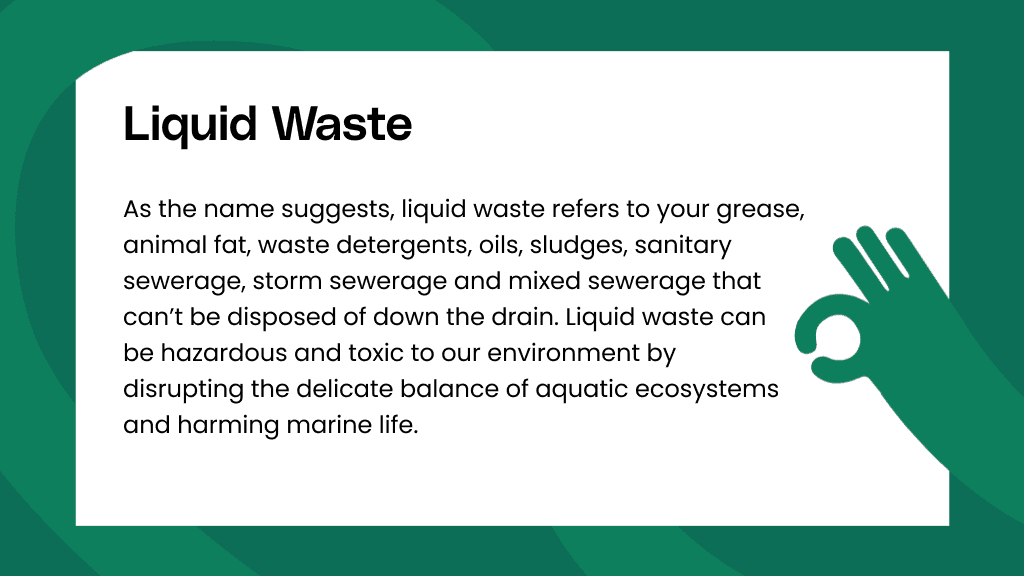The Best Guide To Reclaim Waste
Table of ContentsThe Main Principles Of Reclaim Waste Get This Report on Reclaim WasteReclaim Waste Fundamentals ExplainedReclaim Waste - An OverviewReclaim Waste Things To Know Before You Buy
Explore the kinds, incidents, and types of liquid waste. Residential sewer waste refers to the waste and items from a residential sewage-disposal tank. This sort of waste is created by humans in residences, institutions, and various other structures. This only includes sewage-disposal tanks that have a drainpipe area. The proper management and disposal of residential sewage waste require fluid waste to be moved to a sewer therapy plant where the appropriate approaches and devices are related to cleanse and dispose of waste.
Commercial waste usually includes possible risks, such as combustible products or a mix of fluid and strong waste products, and requires a more innovative and comprehensive disposal process. The disposal of industrial waste usually includes the purification of waste prior to transport to ensure risk-free and proper disposal. Industrial waste is produced from results and drainage of industrial processes and manufacturing.
This sort of waste can not utilize the exact same sewer management transport or procedures as septic or industrial fluids. The hazardous waste management procedure requires the assessment and screening of liquid waste prior to it goes through the disposal procedure (industrial wastewater treatment). Drainage waste is the fluid waste that originates from drainage and excess stormwater in very populated locations or cities
Runoff waste can trigger contamination and flooding if not managed correctly. Discover more regarding sewer cleansing and waste administration. Ensuring proper waste management can prevent disasters and minimize ecological harm. Both people in household setups and experts in commercial or manufacturing markets can gain from understanding the procedures and guidelines of fluid waste management.
The smart Trick of Reclaim Waste That Nobody is Discussing
Call PROS Solutions today to find out about our waste administration and disposal services and the appropriate methods to care for the liquid waste you create.
(https://www.awwwards.com/reclaimwaste1/)This so-called 'wastewater' is not just a crucial source yet, after therapy, will certainly be released to our land, rivers or the ocean. Made use of water from toilets, showers, bathrooms, kitchen area sinks, washings and industrial processes is known as wastewater.

water made use of to cool down equipment or tidy plant and devices). Stormwater, a form of wastewater, is runoff that flows from farming and city areas such as roof coverings, parks, gardens, roadways, paths and gutters into stormwater drains pipes, after rainfall. Stormwater flows unattended straight to regional creeks or rivers, eventually reaching the ocean.
Some Known Facts About Reclaim Waste.
In Queensland, a lot of wastewater is treated at sewage treatment plants. Wastewater is moved from residential or commercial websites with a system of sewage systems and pump stations, known as sewage reticulation, to a sewer therapy plant.
The Division of Natural Resources recommends city governments about handling, operating and preserving sewerage systems and therapy plants. In unsewered locations, city governments might require owners to mount specific or household sewer therapy systems to deal with domestic wastewater from toilets, cooking areas, restrooms and washings. The Division of Natural Resources authorises the usage of home systems when they are shown to be efficient.
In some brand-new neighborhoods, treatment of some stormwater to remove clutter, sand and crushed rock has actually begun using gross pollutant catches. Wastewater therapy takes place in 4 stages: Removes strong issue.
Wastewater after that flows into large tanks where solids resolve and are eliminated as sludge. Oil and residue are skimmed from the surface. Uses tiny living organisms called micro-organisms to damage down and get rid of continuing to be liquified wastes and fine particles. Micro-organisms and wastes are included in the sludge. Gets rid of nitrogen and phosphorus nutrients that can create algal flowers in our rivers and threaten marine life.
About Reclaim Waste
Nutrient removal is not readily available in all sewer therapy plants due to the fact that it calls for costly specialised tools. It is ending up being more common in Queensland. Clear fluid effluent created after therapy may still include disease-causing micro-organisms. If this effluent is launched right into waterways such as rivers or the sea, the micro-organisms will ultimately pass away out.

This more helpful hints normally indicates wastewater needs to be treated or contaminants gotten rid of prior to it can be released to rivers. Most wastewater moves right into the sewerage system. Under the Act, neighborhood governments carry out authorizations and licences for environmentally pertinent activities (Ages) involving wastewater releases that might have a regional influence. The department provides authorizations and permits to Periods entailing wastewater releases that might have a regional or statewide impact.
3 Simple Techniques For Reclaim Waste
Surveillance offers factual information about water high quality and can verify that licence conditions are being met. The details gotten via monitoring offers the basis for making water top quality choices.